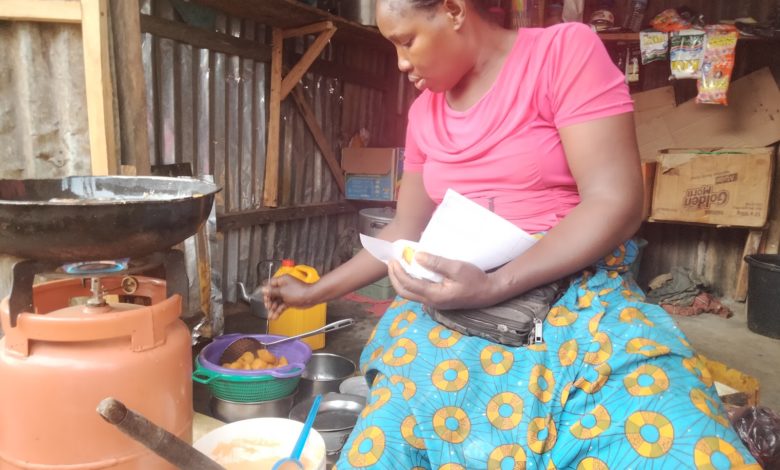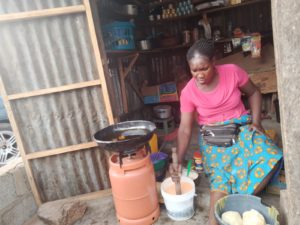Saving The Planet: Akara Without Firewood Smoke
While others in her line of business depend on firewood, Chinyere Isaac makes use of a camping gas cylinder to fry akara in one of Abuja’s suburbs.

Eight years ago, Chinyere Isaac, now in her late forties, decided to start selling akara (fried bean balls) to supplement what she made from her grocery store.
Five years later, as her business progressed, she switched to using camp gas because the smoke from frying akara with firewood put her sight and health in danger.
The mother of six had left her hometown, Onicha Igboeze, Ebonyi State, Southeast Nigeria, with her young family to Nigeria’s capital city, Abuja over 20 years ago, in hope of a better life. She’s on her way to having one.
Journey so far
“I started with firewood, but it was hurting my eyes. So I started using gas three years ago. I would have stopped if not for the gas,” Mrs Isaac says.
In 2020 a World Health Organization (WHO) and International Centre for Energy, Environment and Development (ICEED) report indicated that more than 93,000 Nigerian women and children die annually from firewood smoke and close to four million people globally die prematurely from illness attributed to household air pollution due to their cooking practices.

Mrs Isaac works two shifts everyday and makes an average of N6,000 in the morning. She closes by midnight after making an average sale of N5,000 from her night shift.
Everyday at 4 a.m. WAT, she gets ready for the day’s business. From 6 a.m. when she resumes at her shop, she navigates through attending to her customers, ensuring her children prepare for school, and also setting up for her night shift.
“I start the night shift by 6 p.m. and close by 11 a.m.. I don’t go back home until I close. I stay and sell provisions,” she says. “It’s a hard one, but with God I am pulling through. He is my strength.”
When she opened her provision business over 15 years ago, she was lucky to get a space in front of where she puts up a makeshift structure using zinc roofing.
Among those who patronise Mrs Isaac daily is Mr Ezekiel*, a father of four. The lack of smoke is an attraction for him.
“She is the first person I have ever seen making use of gas to fry akara. I was surprised and that was how she captured my attention. Most times I come here with my kids to buy from her on our way to work because smoke will not disturb us,” he tells HumAngle.
Her customers, who consist of schoolchildren, adults, civil servants, and other professionals, do not only come to Mrs Isaac’s spot because of her jovial nature but because they can queue without being disturbed by smoke.
An expensive but less stressful alternative
Using gas is not cost effective for Mrs Isaac but she says it is better than firewood and less stressful.
“Gas is better for me. I turn it on and off as I want. But when I put out a wood fire, I would have to sprinkle kerosene and fan it before it bursts into flames,” she says. “Also, with firewood I will be outside under the rain and have to endure the smoke.”
Mrs Isaac spends approximately N9,500 on gas every month depending on the number of customers she gets.
“I have two gas cylinders, 6kg and 10kg. I buy 6kg at the rate of N4,000 and 10kg N4,500. The 10kg lasts two weeks. If sales move fast, the gas also runs out fast. But if the market is slow, it lasts more than two weeks,” Mrs Isaac explains. “But 6kg lasts a week if sales is good but goes beyond if it isn’t.”
Hope for a better future
Mrs Isaac is able to care for her family from her business. The akara trade has been most helpful, she tells HumAngle. She is able to raise money to pay tuition for her two younger children and feeds the family while her husband focuses on paying bills and school fees for those in secondary school.
“My husband is comfortable because I am helping him. I spend N35,000 on school fees and any other thing they may need each term. I don’t ask my husband what the children will eat or take to school. I give them what I can,” she adds.
However, the stress is still telling on Mrs Isaac and she is currently looking for a job while she works at expanding her business.
“The profit is not much. It has not increased from when I was using firewood,” she says.
Mrs Isaac wants the best for her children who have big dreams. One of them wants to become a banker and this spurs her on, especially because she was unable to further her own education.
Saving the planet
Mrs Isaac’s action, although done for ease of work, enhances conservation against the consequences of climate change.
Nigeria has one of the highest rates of deforestation in the world, having lost around 410,100 hectares per year from 2005 to 2010. The main drivers of deforestation in the country are agriculture, logging and mining.
The country lost 14% of her primary forest between 2002 and 2020. Forests have been cleared for logging, timber export, subsistence agriculture and notably the collection of wood for fuel which remains problematic in Western Africa. The high demand for firewood for cooking and a source of income for loggers, mainly in rural areas, increased the rate of deforestation.
Support Our Journalism
There are millions of ordinary people affected by conflict in Africa whose stories are missing in the mainstream media. HumAngle is determined to tell those challenging and under-reported stories, hoping that the people impacted by these conflicts will find the safety and security they deserve.
To ensure that we continue to provide public service coverage, we have a small favour to ask you. We want you to be part of our journalistic endeavour by contributing a token to us.
Your donation will further promote a robust, free, and independent media.
Donate HereStay Closer To The Stories That Matter





I’m overwhelmed by her approach to saving the planet and preparing healthy akara.
Thank you Mrs issac.